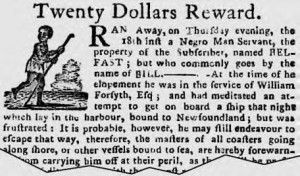Published by Koharu on 15 Sep 2009 at 09:34 am
Image Gloss: ‘Runaway Slave’

The runaway slave came to my house and stopped outside,
I heard his motions crackling the twigs of the woodpile,
Through the swung half-door of the kitchen I saw him limpsey and weak,
And went where he sat on a log, and led him in and assures him,
And brought water and filled a tub for his sweated body and bruised feet,
And gave him a room that entered from my own, and gave him some coarse clean clothes,
And remember perfectly well his revolving eyes and his awkwardness,
And remember putting plasters on the galls of his neck and ankles;
He staid with me a week before he was recuperated and passed north,
I had him sit next me at table….my firelock leaned into the corner.
I picked this part of the poem to write on because it is the most distant to me. During the 19th century South, African Americans didn’t sit at the table to eat dinner or get clean clothes and they most certainly weren’t taken into the home of random Caucasians in the south for a week. They were hunted like criminals and had bounties put on their head. To house, bathe, feed and clothe a runaway slave was one of the greatest taboos of the time period. It’s a testament to how different from everyone else Walt Whitman was.
s-words on 15 Sep 2009 at 4:44 pm #
This is an excellent double-image: it encapsulates both the slave fleeing and the kind of advertisement used as a tool by which to hunt that slave down. That portrayal as a means of capture provides a fascinating counterpoint to the feeling many readers have with regard to the passage you quoted: Whitman seems, those readers contend, to be exploitively appropriating the slave as much as he is “demoncratically” including him in his vision of America.